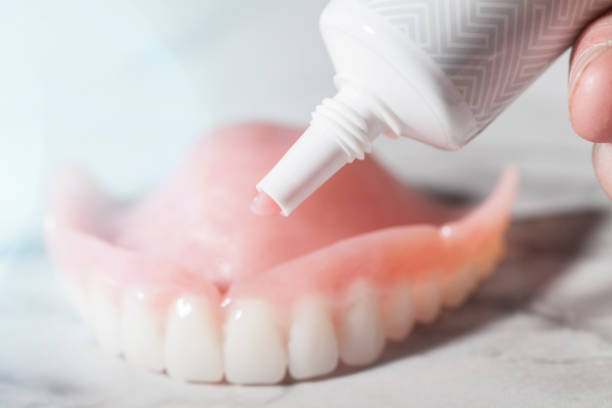No comments yet.
RSS feed for comments on this post.
Sorry, the comment form is closed at this time.

Whether you’re missing several or all of your teeth, it can be difficult to adjust to. Things like eating, speaking, and laughing that used to be simple can now feel more challenging. Fortunately, there are several solutions to missing teeth, including dentures. These restorations have been around for a very long time and are one of the most popular ways for patients to replace missing teeth. for those who wear full dentures, sometimes a little help is necessary to get them to adhere as intended. Read on to learn about a few different types of denture adhesive so you can determine which one is right for you.
Denture adhesive strips are convenient, easy to apply, and can prevent your dentures from slipping. They prevent food from getting trapped under your restorations by providing a tight seal. They also offer a secure fit for all-day hold. Every adhesive strip is pre-cut, and they have just enough adhesive on them to prevent oozing. Adhesive strips can be a bit expensive, so make sure that they fit into your budget.
Denture adhesive creams are the most popular type on the market. You can apply a small amount of cream to the underside of the dentures for a strong hold that lasts the whole day. Denture adhesive creams keep food from getting under your restorations, which helps you avoid gum irritation. This will make it comfortable to wear your restorations for long periods. Additionally, many adhesive creams come in different flavors, meaning they can also give you fresher breath.
Adhesive powder soaks up water to adhere to your dentures and your gums. It can keep your dentures in place for 12 straight hours. Powders are a popular alternative to creams and are incredibly convenient. Apply a thin layer or powder to the underside of your restorations and shake off the excess before putting them in your mouth. Bite down to secure your restorations in place.
If your dentures were made correctly, they should fit your mouth without issue. Even so, the lack of stimulation from missing teeth will cause your jawbone to deteriorate over time, which can make your restorations fit incorrectly. In this case, they can be repaired, replaced, or adhesive can be used to hold them in place. A few other times when adhesive may be necessary include
If you still aren’t sure what kind of adhesive to use, ask your dentist. They will be able to help you determine which one is the best option for your smile
Dr. Brooke Buller and Dr. Clay Odenweller lead the team at Claybrooke Dental of Gahanna. They treat their Gahanna patients from the comfort of their inviting dental office and strive to make them feel comfortable and well cared for. If you’re missing teeth, they offer dentures and other replacement options. They can also teach you about different types of denture adhesive for extra hold. Call Claybrooke Dental of Gahanna at (614) 475-1874 or visit their website to learn more or to make an appointment.
No comments yet.
RSS feed for comments on this post.
Sorry, the comment form is closed at this time.